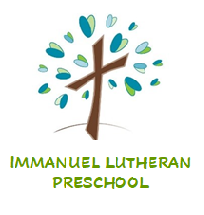Objectives
- To acquaint your child with Jesus and His love for them
- To help develop a positive and healthy self-concept in your child as feelings of success and security grow
- To help your child establish himself "away from home"
- To help your child to get along with others
- To broaden your child's growth experiences; spiritually, socially, emotionally, physically, and mentally
- To sharpen your child's senses
- To help your child to enjoy experiences that develop imagination and creative expression in music, art, and literature
- To help your child to listen and follow directions
- To form a close home/school relationship
- To provide a positive attitude for later, more formal education
Curriculum Content
Early childhood education at Immanuel can be easily divided into five broad categories. Various themes through the year will incorporate these five areas and include an introduction to the alphabet.
These areas are:
1. Spiritual/Social Living
- relationship building
- interrelationships
- small group play
- one-on-one between children attitudes and relationships to the Lord and others
- moral development
- values
This is carried out through themes that use:
- Bible stories
- home and family
- friendships
- sharing
- growth
- taking turns
- positive self concept
- felling and emotions
- using your words
Religion - Our school exists to help foster a Christian view of life. We know that each child of God, and therefore we help and encourage each child to grow and be nurtured in God's Word. Christian worship and educational activities appropriate to the child's maturity level are a regular part of our school's program
2. Communication Arts
This includes:
- the ways we communicate
- development of listening and speaking
- beginning of reading and writing
This is carried out through themes that use:
- discussion
- listening
- sharing information
- role playing
- story telling
- mimicking
- reading words
- using puppets
- big books
We encourage parents to help children recognize their own name. Only the first letter of the name is capitalized.
Children observe the written word in various ways through big books, wipe-off boards, and finger-plays and songs written out. This helps the children begin to understand and make sense of letters and sounds.
3. Expressive Arts
This includes:
- foundation for art, music, movement, drama
- creative expression of feelings and ideas
- active participation of the child
- use of creative materials and activities
This is carried out through themes that use:
- painting
- dramatizing
- drawing
- musical games
- rhythm instruments
- songs
- dancing
- collage work
- movement
4. Wellness
This includes:
- foundations for health, safety, nutrition, fitness
- promotion of positive attitudes toward a healthy lifestyle
- development of responsibility and autonomy
- large muscle movement and activities
This is carried out through themes that use:
- walking
- dancing
- drawing
- all gym activities
- hopping
- jumping
- climbing
- rolling
- bending
- running
5. Discovery About the World
This includes:
- discovery about the world around them
- foundations for science, social studies, math
- organization of ideas and objects into categories and classes
- manipulation and observation of real materials and phenomena
This is carried out through themes that use:
- science experiments
- hands-on activities
- sequencing
- sorting
- graphing
- counting
- weighing
- quantifying
- water/rice play
Activities from each curriculum area are included in your child's schedule several times a week.
We focus on the total development of the child: spiritually, socially, intellectually, emotionally, and physically.


